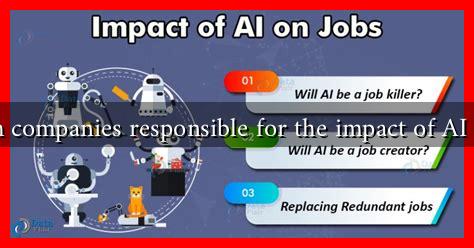-
Table of Contents
Are Tech Companies Responsible for the Impact of AI on Jobs?
The rapid advancement of artificial intelligence (AI) has sparked a heated debate about its implications for the job market. As AI technologies become increasingly integrated into various industries, concerns about job displacement and the future of work have emerged. This article explores whether tech companies bear responsibility for the impact of AI on employment and examines the broader implications of this technological shift.
The Rise of AI and Its Impact on Employment
AI has transformed numerous sectors, from manufacturing to healthcare, by automating tasks that were once performed by humans. According to a report by McKinsey, up to 800 million jobs worldwide could be displaced by automation by 2030. This staggering statistic raises questions about the role of tech companies in shaping the future of work.
Understanding the Role of Tech Companies
Tech companies are at the forefront of AI development, creating algorithms and systems that enhance productivity and efficiency. However, their responsibility in mitigating the negative impacts of AI on jobs is a complex issue. Here are some key points to consider:
- Innovation vs. Responsibility: While tech companies drive innovation, they also have a responsibility to consider the societal implications of their technologies. The question arises: should they prioritize profit over the welfare of workers?
- Job Creation vs. Job Displacement: Although AI can lead to job losses, it can also create new opportunities. For instance, the World Economic Forum predicts that AI will create 133 million new roles by 2022. Tech companies must focus on fostering an environment where new jobs can thrive.
- Ethical Considerations: As AI systems are deployed, ethical considerations must be taken into account. Companies like Google and Microsoft have established AI ethics boards to address these concerns, but the effectiveness of these measures remains to be seen.
Case Studies: The Dual Nature of AI
Several case studies illustrate the dual nature of AI’s impact on jobs:
- Amazon: The e-commerce giant has implemented AI-driven robots in its warehouses, leading to increased efficiency. However, this automation has also resulted in job losses for many warehouse workers. Amazon has responded by investing in employee retraining programs, but critics argue that these efforts are insufficient.
- IBM: IBM’s Watson has revolutionized healthcare by assisting doctors in diagnosing diseases. While this technology enhances patient care, it also raises concerns about the future of medical professionals. IBM has committed to reskilling its workforce to adapt to these changes.
- Uber: The ride-sharing company has faced backlash for its use of AI algorithms that determine driver pay and job availability. As self-driving technology advances, the potential for job displacement among drivers looms large. Uber has acknowledged this challenge and is exploring ways to transition its workforce.
The Need for Collaboration
Addressing the impact of AI on jobs requires collaboration among various stakeholders, including tech companies, governments, and educational institutions. Here are some strategies that can help:
- Policy Development: Governments should create policies that encourage responsible AI development while protecting workers’ rights.
- Education and Training: Educational institutions must adapt curricula to prepare students for the jobs of the future, focusing on skills that complement AI rather than compete with it.
- Corporate Responsibility: Tech companies should take proactive measures to ensure their technologies benefit society as a whole, including investing in workforce development and ethical AI practices.
Conclusion: A Shared Responsibility
In conclusion, while tech companies play a significant role in the development and deployment of AI technologies, they are not solely responsible for the impact of AI on jobs. The responsibility lies with a collective effort involving governments, educational institutions, and society at large. As we navigate this technological landscape, it is crucial to prioritize ethical considerations and workforce development to ensure that the benefits of AI are shared equitably. The future of work will undoubtedly be shaped by AI, but it is up to all stakeholders to ensure that this transformation leads to a more inclusive and prosperous society.
For further reading on the impact of AI on jobs, you can explore resources from the World Economic Forum.

